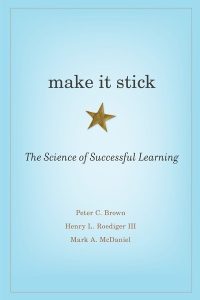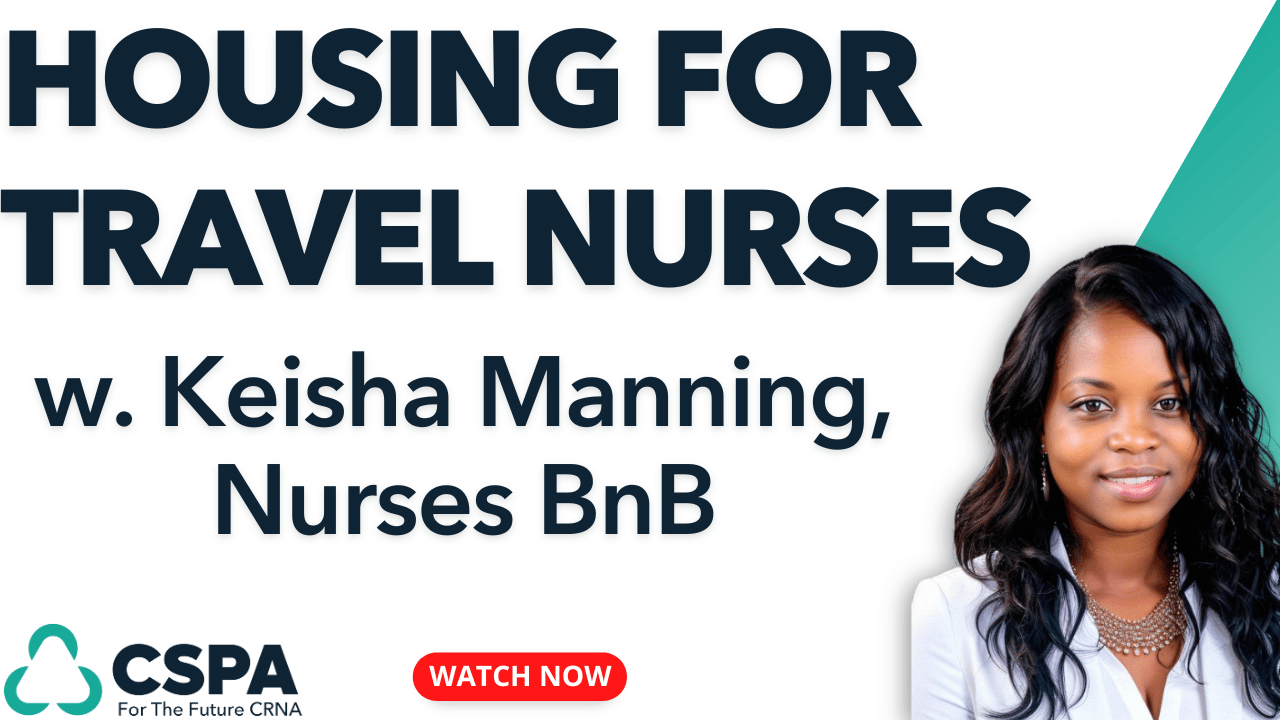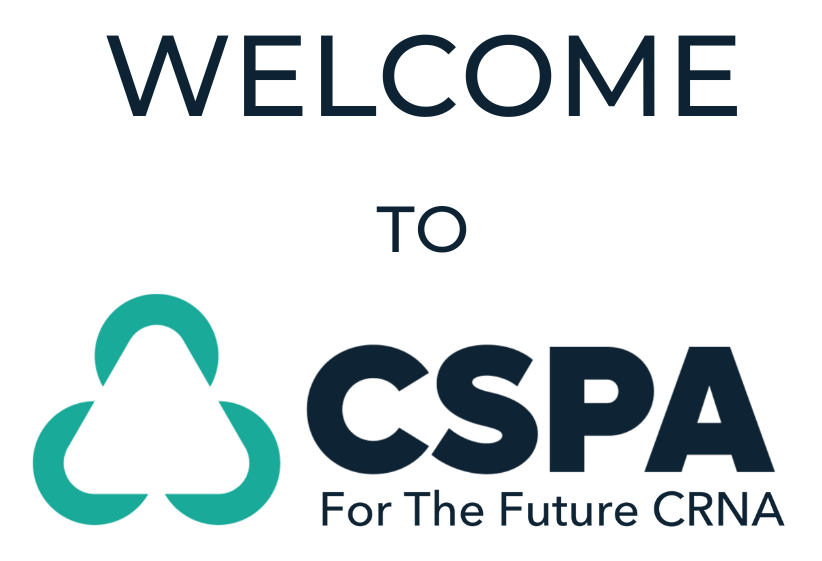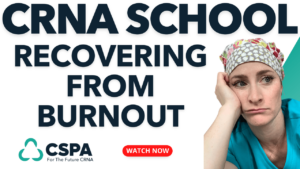
Get Your Free CRNA School Interview Prep Guide
Free CRNA School Interview Prep Guide Click Here
Prioritizing your mental wellness is not a luxury, it’s a necessity. The path to successfully surviving CRNA school is not a sprint, it’s a marathon. Take care of yourself along the way, and you’ll go further than you ever thought possible. In this episode, we sit down with Cori Stone, a CRNA student who has also worked as a NICU and travel nurse. Cori shares her journey on how she recovered her mental wellness after experiencing burnout during CRNA school. She talks about the importance of putting your mental health as a priority and making the necessary adjustments to achieve balance. Cori shares personal experiences and practical tips for maintaining mental wellness while pursuing a demanding career and avoiding burnout. She emphasizes that no matter how prepared you think you are for CRNA school, the experience will still be something you couldn’t have expected. Tune in and learn from a NAR herself about resilience and self-care in nurse anesthesia school.
Get access to planning tools, mock interviews, valuable CRNA Faculty guidance, and mapped-out courses that have been proven to accelerate your CRNA success! Become a member of CRNA School Prep Academy here!
https://www.crnaschoolprepacademy.com/join
Book a mock interview, personal statement critique, resume review and more at https://www.TeachRN.com
Join the CSPA email list here! https://www.cspaedu.com/podcast-email
Send Jenny an email or make a podcast request!
Hello@CRNASchoolPrepAcademy.com
Follow Cori on IG at Stonesthesia
—
Watch the episode here
Listen to the podcast here
Surviving CRNA School: How To Recover Mental Wellness After Burnout In CRNA School With SRNA Cori Stone
We have a very special guest, Cori Stone. Welcome to the show, Cori.
Thanks for having me.
A fun backstory on Cori is she was a CSPA student. Congratulations, you only have a year left! It’s like you can start seeing the light at the end of that tunnel. It’s been fun to follow her journey on social. If you guys don’t follow her already, you need to. She’s very open about her anesthesia journey and what it’s like being a student surviving CRNA school.
Something else unique about Cori is that she is a NICU nurse and she also has a travel nursing background, which is like, “That going to be okay for CRNA school? Can I travel and still have a good enough background to get in? Can I be a NICU nurse?” This is living proof right here. For those of you who are NICU nurses, the hope is there. The biggest thing I want to say about that is you have to research your schools.
You will see three things. Yes it’s accepted, individual basis, or no. The no is a no. The yes is a yes, and the individual basis is maybe if everything else is stand-out perfection. I would err on the schools that say yes, that would be your top choice; the individual basis, those ones, you are taking a gamble, but know that going into it and you will be okay.
We are going to talk about an important topic, which is dealing with mental wellness in school, and having Cori share what her experience was like and what she’s done to put her mental wellness as a priority, which you went through where you had to make some big adjustments. Welcome to the show.
Thank you. I’m happy to be here. To piggyback off of what you were saying, a lot of us SRNAs, RRNAs, and nurse anesthesia residents, tend to be type A perfectionists, so we are always pushing ourselves. We are trying to do the best that we can possibly do. Sometimes that translates to pushing too hard, overworking yourself, and then finding yourself in a situation where you have done too much. You are not prioritizing sleep and wellness, and then it catches up with you. That’s exactly what happened to me.
The third semester was our busiest didactic semester. It was very heavy for pharmacology. It was very dense and had tons of memorization. I found that I was waking up, brushing my teeth, studying all day long, barely giving myself breaks, and pretty much studying until the day ended, until I was ready to crawl into bed at the end of the day.
Logically thinking in my mind at that time, it made sense that in order to onboard all of the information that I was being given every day in class, I needed to maximize my study time, and at that time, that meant quantitative. Those are hours and hours of time. I was basically spending all of my time doing that. I wasn’t sleeping well.
I was a night shift nurse for five-plus years prior, so I already wasn’t a good sleeper. I was probably averaging about 3 to 4 hours of sleep a night, and it wasn’t restful sleep. I was so stressed, I was exhausted, and I found that as a result, my study techniques were not effective. I wasn’t doing as well as I thought I probably should. Given the amount of time I was spending studying, my exam grades weren’t well as I expected they would be.
Before I knew it, I was waking up with massive hives all over my neck and my face, and the rest of my body that weren’t being mitigated by taking Benadryl or anything that I had at home. My hair started falling out, which I have never had an issue with before. I found myself in the emergency room because these hives kept getting bigger. They were starting to be around my neck, my mouth, and my face area. I got a little concerned.
I ended up in the emergency room, and what it came down to was extremely high cortisol levels from very high stress, not prioritizing sleep, and being completely exhausted. After that happened, especially on top of the fact that I wasn’t doing as well as I should have been doing in school, I realized that I needed to make a change.
What I ended up doing was developing study habits that were more efficient. What I had been doing was writing everything out, taking a lot of time to make sure I had everything written, and then before I knew it, I had spent all that time writing and was left with not as much time to study. I changed my study habits to make sure they were more efficient.
I was allowing myself breaks, which is so important. I’d have to look back and see, which is what somebody once told me that you remember best what you onboard at the start of your study session and the end of your study session. Logically, if that’s the case, if you have breaks, you have more of those start and finish periods and you are onboarding more of that information. I was making sure that I was trying to get as close to 7 to 8 hours of sleep as I could.
You remember best what you onboard at the start of your study session and the end of your study session. Share on XI was also giving myself days off. I still do this now. I take a day off a week from school to do something that brings me joy or I can totally disconnect from school, whether that’s laying in bed in my PJs and bingeing Netflix shows or going outside, going for a run, or going to see my family and friends. At the end of the day, every day I take about an hour to disconnect as well.
At the end of the day, that’s watching TV or reading a book that’s not Barash or something anesthesia-related, but something that allows me to disconnect a little bit. As a result of changing those study methods and making sure I was better rested and I was prioritizing my mental health, my test scores improved. My overall performance in school improved. That probably has a lot to do with the fact that the time that I was allowing myself to study was much higher quality study. I was able to retain more. Let’s be honest, I’m a much happier person when I’m well-rested and not completely exhausted.
Thank you for sharing that story. I didn’t realize it got that severe. What I started thinking was that when it gets to be that bad, congratulations and I’m proud of you for getting through that because what can happen is that can start to spiral where it’s hard to ever get out of that and break that. It sounds like it took a pretty big change in your daily routine on multiple levels, not your study habits but your sleep habits, and your self-care habits.
It was multi-factored as far as you had to address more than one area of your life in healthy eating and prioritizing what you need for your own personal wellness. You are exactly right. What you described was a Pomodoro study technique where you take many breaks. It is true that when you are more laser focused and intentional when you go into a task and then you take even if it’s a 5 or 10-minute break, it is enough to reset.
It’s a mental break essentially. It allows you to come back in, and it’s enough to allow you to not be fatigued going back into something. I have heard students describe that feeling of you are staring at a page and you have read it five times but don’t know what it says or like, “How have I not gone past this page?”
I have been studying for ten hours and my brain’s telling me no more is what it’s down to.
If you guys find yourself doing that, this is a huge red flag for you to address this issue. I also love how you shared your study techniques and what had worked for you in the past as far as writing things down. I’m a big fan of that too. There is something about that muscle memory and writing things down. I love highlighters too.
It is all the different rainbow colors, but at the same time, you have to blend efficiency with effectiveness. Sometimes making flashcards and writing everything down is not the most efficient way. You have to be able to adapt to try other methods that will equally increase your effectiveness. That could be re-listening to a lecture while you are cooking dinner or doing something like that where you are maybe doing some audio listening and mixing it up a little bit with your tactile learning and reading.
Study Techniques For CRNA School
One of the biggest pieces of advice that I give to people is you have to be flexible in your study techniques. Depending on what semester you are in, if it’s fully didactic, if it’s the front-loaded portion where you are onboarding a ton of items that you are having to memorize, or if you are in the clinical portion of things where you don’t have much time, you are going to constantly have to make adjustments to your study plan because not every class a certain study technique is going to be as effective as it was for a different class. Constantly be evaluating your study techniques and make those appropriate changes. If you stay steadfast in one study technique, you are going to find that it sometimes doesn’t apply and translate to other classes.
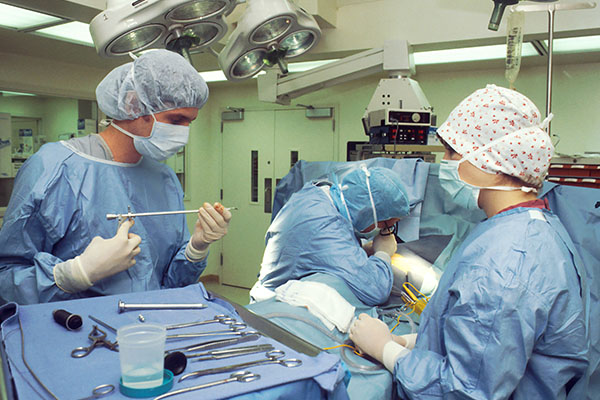
CRNA School Burnout: Constantly evaluate your study techniques and make those appropriate changes. If you stay steadfast in one study technique, you are going to find that it sometimes doesn’t apply and translate to other classes.
That’s great advice. Thank you for sharing that. I also want to address the fact that you looked at your daily routine and the time you were spending between studying and self-care and realized you had to step up the self-care a notch. You even take a whole day off once a week, which is great. I love that you are prioritizing sleep.
That in itself will do wonders for your stress level and making sure it’s restful sleep. I myself struggled in school with sleep. I have always suffered from anxiety. I should knock on wood before I say this because once we had kids, I swear it’s like a hormonal thing, but I don’t have sleep issues like I used to. Maybe because they run me ragged. I’m kidding.
You are exhausted at the end of the day.
I used to consider myself an insomniac, meaning I would have to take Benadryl or Unisom. I tried all kinds of sleeping pills, and that was not ideal but I was desperate because I was going a day or more without sleeping. I don’t know how to describe what that feels like other than an unemotional zombie state where you can’t even think.
It’s unsafe to even drive a car. I was doing that when I was working night shift. That’s what happened to me working night shift. I started struggling with my sleep like you and to the point where it affected my overall health. I went into school with that as well because I worked nights right before until I went into school. It is another thing to think about if you are reading and if this is you because it sounds like Cori had the same experience.
It’s a difficult adjustment, especially if you are doing nights for a long period of time prior to starting school. Allowing yourself a little bit of time in between to make that adjustment is helpful.
I used to power through it when I was at work. Don’t get me wrong. I had a lot of days where I struggled. What’s different in school that’s different than when you are in the hospital is it is so mentally draining. Work was mentally draining but a lot of emotional draining. When you are tired, it’s not good, but it is the exercise that you do to your brain. When you are in CRNA school, you cannot withstand no sleep. You will have this experience that Cori had. Prioritize sleep, figure out what sleep schedule you need, get blackout curtains, and try different sound machines that had sleep music. Play with what can work for you to get restful sleep.
For me, it was a restless mind where if I was worried, I would be forgetting something. I would go to sleep thinking about like, “Do I have dinner planned for the next night?” which was so annoying. I’m like stop, “Go to bed. Who cares about dinner for tomorrow? You will be fine. You will be fed.” What I did is I kept a journal next to my nightstand. When I would have these restless brain moments, I would jot them down so I could know I’d jotted it down and I would go back to sleep and that helped.
It is the little things like that to try. What is the order that you tackled this in? Some people might be questioning, “How did you go out and do all that?” Did you start with your study techniques first and then adjust your schedule, or did you adjust your schedule and then figure out your study techniques with the time now that you had?
It was pretty fluid. It depended on the week. That’s still true for my study and personal life now. I would make a schedule every week. I would have a monthly schedule but then I’d also have a weekly schedule. I’d take a peek at it to see what assignments I have, if I have an exam that I need to study for, and when is this quiz.
I would try to front-load my studying if I could. I still do that now. In order to allow myself to have a day off, most weeks, there are going to be some weeks when there’s so much to do and it’s not possible. When you do have those crazy busy weeks, if you are giving yourself those days off regularly on either side of that, it’s not as big of a deal.

CRNA School Burnout: When you do have those crazy busy weeks, if you are giving yourself those days off regularly on either side of that, it’s not as big of a deal.
What I would do is take a peek at my study schedule and front load it so that I was taking care of as much of that as I could on the front end of things, writing my papers earlier on in the week, or spread out through the Monday through Friday week so that when it came to time for the weekend, I would give myself maybe Saturday to study the material that I might be tested on Monday.
I tie up the last-minute details on any papers that I was working on. Let’s say I felt good on Sunday to give myself a day to disconnect a little bit. When I returned to it, at the end of the day on Sunday or early Monday morning before an exam, I felt refreshed. I felt like it was a good period of time for me to dive back into it because I have given myself that moment in between to do something else and feel well, feel healthy, and feel happy and disconnected from the nurse anesthesia life for a brief moment. It was very fluid and dependent on the week and how much I was juggling with school at that time. I am doing whatever I could to push it to the front end of things and make it so that I could allow myself that day off at the end of the week.
I also think there’s a science behind learning. A book I highly recommend is Make It Stick. That’s a great book. Even more into the science of learning, there’s something about taking that mental break that allows you to build your inner connections in your brain to allow you to retrieve better. If you don’t get that mental break with rest or taking these mental breaks but doing something other than studying, you have a harder time consolidating the knowledge you did take in and creating a file that would be connected to other files in your brain.
If you think of your brain as a file system, it takes time for that file system to have little tiny tentacles that come off and connect to other files, and by resting, it allows your brain to develop those connections. This is all great. We talked about your time management, your study techniques, and your sleep. What advice would you give to someone as far as handling relationships in school, your friends who maybe are not in school, and things of that nature?
Relationships and Kids While In CRNA School
Going into CRNA school, a lot of us understand that your family life and your time with your friends are not going to be the same as it was prior to starting school. However, that’s not to say that it’s okay to let that go by the wayside because those things are important for you, for your happiness, and overall wellness. With regard to relationships, I listened to one of your episodes prior to starting in 2021.
When you were talking about how if you are in a relationship where things aren’t going so well under circumstances where you are not extremely stressed like you will be in CRNA school, that’s something to consider. I did go through a breakup in CRNA school. It was challenging when you are trying to continue to operate at this high level of stress with school but then you have this external stressor that’s huge that you are trying to deal with. It’s difficult.
I would say that that’s something to think about as you said in your episode prior. If you guys are struggling, just consider that one way or the other. Think about seeing a couple’s counselor or something like that, whatever you need to do to examine that and figure out if it’s going to be something that you will be able to also manage while you are in CRNA school.
With regard to family and friends, they certainly recognized when I was going through that stressful time in the third semester when my hair was starting to fall out, I was breaking out in hives, and I wasn’t my happiest. They certainly recognized that and they were awesome. They would show up at my apartment when I’m drilling flashcards nonstop, and they would drop off food for the week. They were always there whenever I needed to call and vent about what was going on in my life, which at that point was 100% CRNA school.
Make sure that you give yourself time. See the people that you care about that make you happy and can help during those stressful periods of your program. The same is true for friends. When I do take a day off or when I do give myself an hour at the end of a day, it’s usually to spend time with either family or friends because they fulfill me and help me. They are a bright light in this challenging situation.
The other thing I would say, too, is it’s important to make sure that your family and friends understand what they can expect from you while you are in school. My family, especially my dad, has always been extremely close. I was over there at their place because I lived fifteen or so minutes away from them. I was over there half the week for dinners.
They could always count on me to be there if there was a family event or a holiday. I did my best to prepare them prior and let them know like, “For the next few years, school is absolutely going to take over my life to some extent.” I am prepping them so it’s not a shock because even though I did prep them to some extent, it’s still going to be a shock if you spend a ton of time with your friends and family.
The best thing that you can do in that situation is to let them know, “I’m going to do my very best to see you as much as I can. There are going to be some holidays that I will miss for clinical or there are going to be some birthdays that I will miss because I have an exam the next day or something like that. That doesn’t mean I don’t love you and I don’t want to spend time with you. It means that school is calling.” It is the same for your friends as well.
Truly, nobody understands. Nobody can. Despite how hard they may try, they can’t understand what you are going through in nurse anesthesia school unless they have either done it before or they are going through it. For friends and family that don’t have that background, it doesn’t make sense to them. At the end of the day, when they are done with work or when they clock out, they are done with work, but our work as nurse anesthesia students never stop. Preparing your family and friends for that is helpful.
Truly, nobody understands. Despite how hard they may try, they can't understand what you are going through in nurse anesthesia school unless they have either done it before or they are going through it. Share on XI even love how there are some people who have been through different grad programs, but it’s still not the same type of rigor that you will be in. Not that you have to rub that in their nose or in their face. I love the fact that you reinforce that, “I still love you. I still care about you. I still want to hang out with you. I just need to make this my priority. I worked so hard to get here. My priority is to make sure I’m passing, graduating, and I have to do whatever it takes to do that.”
Having those conversations ahead of time is going to save you because even if your friends don’t mean to, they are all human. They might get sad or bummed out if it happens over and over again and they haven’t been pre-warned, “They did say this.” Also, give them that timeline like, “This is when I graduate. When we graduate, let’s plan a girls’ trip. Let’s plan a celebration and then we can have more time together.”
The other thing you can do, too, with whether or not you are in a relationship with somebody or whether you are talking about family or friends is letting them know what would be extremely helpful to you at that moment. Like I said, my family brings me food for the week because there were some days when it felt like meal prepping was the most difficult task I have ever heard of. It is saying that or asking your friends if they go to get a coffee if they could pick one up for you and swing it by on their way home. That way, they are still getting to be involved. When you do have that time off, you are prioritizing that time with them so they know that it’s an important relationship to you, but it’s different while you are in school.
I love that you have said that too. Even if you are married, especially if you have been married for a while, it’s key to address what your daily typically looks like and who does what chores, who does most of the childcare, grocery shopping, house care, or whatever it may be. That may also shift and you may have to say it would be helpful in school when I asked you to or when I requested, or if you could do X, Y, and Z in addition to what you already normally do. Have those conversations because, out of the blue, if they are in a stressful week and you are in a stressful week and you ask them to do X, Y, and Z extra, they might snap back at you. If you have these conversations ahead of time they’d say, “They did say they might ask me to do extra.” that has to be a hard conversation that has to happen.
Hopefully, they know that the end goal is that you will both be supported and better for it so therefore they would support you to do it. Marriages would be hard if it’s not good going in because you can’t say, “We are breaking up.” You could. Technically, it’s still breaking up a marriage. It’s one of those things where most people are not going to be like, “I’m going to get divorced so I can go through CRNA school.”
With that being said, you mentioned the therapy ahead of time. That is key. I know not everyone’s probably open to therapy, but the conversation still needs to happen. Here is a worst-case scenario because there are people reading who are like, “I still don’t know what to do because I know my significant other is not going to be supportive. This is going to be a struggle the whole way through. I’m so scared,” and maybe you feel alone.
I want to speak to you right now that you need to see who else could be your support. If you have children similarly, who else can support you? If it’s not your spouse, can it be a grandma, a grandpa, an uncle, or a friend? Who else can help you with childcare if you know you are going to struggle on the home front? Sometimes it’s the relationship dynamic and you don’t need to feel alone or scared to deal with these things. You have to know a backup plan and what you are going to do. Know that you deserve that support. If you can’t get it from your significant other, you have to find other ways to get it.
A support system is hugely important in CRNA school. I don’t have any kids myself. I have two cats. They are my babies at the moment, but I have plenty of classmates who have families, who have kids that they are taking care of. They are doing well in CRNA school, and they attribute a lot of that to the fact that they have such a strong support system. It’s so important.
Going back to what you were saying about making sure that you are having those conversations and those relationships about what to expect, the other thing too is if you are asking for things that are helpful to you at that moment, whether it be meal prepping, picking up the kids, or whatever it may be, that gives them the opportunity to feel like they are involved as well.
They can’t understand what you are going through in CRNA school. They are not part of the getting the degree process. They can only help so much with studying. They can do flashcards with you and things like that. Allowing them the opportunity to have moments where they feel like they are contributing to that process is important too.

CRNA School Burnout: Allowing your support system the opportunity to have moments where they feel like they are contributing to you is important too.
If you guys have kids, let them know that when mommy or daddy is done with school, “We are going to plan a family trip to,” and name the spot that they want to go. Even though if you say, “Mommy can’t play. I’m studying, but when I’m done with school, we get to go do this.” Always remind them that there’s an outcome that’s going to be desirable for them too. It allows them to feel included and then have them quiz you. Have mommy quiz time, depending on the age of the kids.
Let them be involved in the process as well and try to find creative ways to have them feel like they are helping you be successful, so that way, you guys as a family are set. I would love to round this up with something. You sound so well put together as far as what happened, what you did, and where you are now.
What Do You Know Now That You Wish You Knew Before Starting CRNA School?
You do sound like you have it all figured out, but my question is, how did you feel prior to starting school? I bet you are going to say, “I felt like I was well prepared to start school,” and you still went through that pretty substantial experience. Is there anything that you could reflect upon before you started school that you thought you knew but you didn’t know? What would that be?
I’d like to say, “Trust me. There are days that are extremely hard days and I don’t deal with it particularly well.” I might right now. I might feel and seem as though I’m coping well and I’m doing well. I am right now for the most part. There are still going to be days when we have off days or we have challenging days in school. This is not to say that there are not those days. Those days are still going to happen regardless of whether or not you have made positive changes in your study habits and things like that.
In terms of feeling prepared prior to school, I did. We all feel like we are fairly prepared when we are entering into CRNA school because most of us are doing a ton of research prior and try to get into the mindset that we understand what to expect. I have also been the type of person that operates well under stress. I am a licensed skydiver. I like to do high-adrenaline things.
I felt like I have been able to do all this stuff. I like adrenaline. I work well under pressure and stress, all the things that you put on your resume, but this is a different type of stress. CRNA school is an incredibly challenging thing to go through. It is nonstop. You are going to give yourself breaks. For three years, your school is a huge part of your life, if not your whole life somewhat. Though I felt prepared because I knew how I reacted to stressful situations prior, give yourself the space to think about, “This is a different experience than I have ever experienced before.”
Let me make sure I’m setting myself up for success by doing healthy things on the front end so I’m not finding myself in a situation where, “My hair’s falling out. I got hives everywhere. What happened?” At that moment, prior to that happening, I recognized that I was studying too much and that I wasn’t sleeping enough, but I felt like I was managing it okay until my body told me I was not.
That is when I came to the realization, “This is clearly not working. This has never happened to me before. I need to make some changes.” One of the questions that I get asked a lot is, “I have gotten into CRNA school. I start in a few months. What can I do to prepare?” I’m sure everybody rolls their eyes at me when I say nothing.
Identify study apps that you’d like to use so that you are not learning how to use those apps at the same time you are trying to study. Familiarize yourself with those apps, but aside from that, go on that vacation you have been wanting to go on. Take that time off work. Spend that time with your family and your friends because those things will look very different once you start school.
CRNA school will prepare you for everything that you need to know to provide anesthesia. You will learn everything that you need while you are in school. There’s no amount of preparation I think that is going to be substantially helpful prior to starting school. That’s an important time to prioritize your health and wellness, your family, and the things that are important to you.
Familiarize yourself with the concept that, “This is going to be very stressful. Let’s make sure I’m doing the things that I need to do early on to prevent myself from finding myself in a position where I’m extremely stressed, overwhelmed, my study methods aren’t working, my family’s upset because I’m freaking out at them,” and things like that.
Though I felt prepared, I wasn’t. A lot of people experience that. The more awareness that can be brought to an SRNA or RRNA, nurse anesthesia resident about wellness, it’s an important topic. Most of us will find ourselves in a situation once or multiple times when we are overloaded and panicked. There’s too much. There aren’t enough hours in the day, but if you can set yourself up for success, you can try to minimize those bad days.
You mentioned the beginning type A, and it sounds like a recurring theme that everyone has somewhat of an expectation for what they probably can do with 24 hours in the day. You want to always do your best and you are used to showing up as your best, but the reality sometimes is that good enough is good enough.
Sometimes you are going to have days where that’s okay, you just have to pass the test, and you have to do good enough in clinical to where you don’t get an angry preceptor coming at you, and that’s okay. It’s okay not to always be that rockstar and to give yourself that grace that you need to take a deep breath. I also face a lot of students asking me, “What do I do before I start school?” That’s a very hard question to answer because it’s incredibly different for every single person.
It’s one of those things where it depends on what you as an individual need. Spend time with your friends and family. Take a breather. You did it. You got into school. This is amazing. Take this time to celebrate, but know what you need. Meaning, do you need to take one more trip with your family? Have you not had one? If yes, you need that.
Maybe you got back from vacation. Now what do you need? Maybe you need to address your relationship with your husband. We will start working on that or maybe you need to get your finances in order. We will work on that. There are still plenty of things you can do that are not necessarily study-related that are going to set you up for success. As far as students asking, “What books can I read and what things I can study?” I do think there are things that you should not do and things that you think you need because you are identifying this need, loop, or gap.
Now, every single person probably thinks they have an educational gap, but what’s tricky about that thought is you won’t know until you are in the thick of it and you are confronted with the knowledge they expect you to know already, and you are already like, “I’m a deer in headlights. Now what?” With that being said, it reflects upon how long ago your chemistry or pathophysiology was and how did you do. Ask yourself, “Was this subject that I struggled with back in the day or did I thrive?”
If you struggled in it, well then it may be worth brushing up on but not in a way that means you are binging every book out there and not in a way that means that you are spending all your free time trying to understand every single concept. What Cori pointed out is the anesthesia curriculum will teach you everything you need to know, and it’s incredibly niche. Meaning it’s not every single topic in chemistry, physics, anatomy, or pathophysiology.
It’s very specific to what you are going to deal with every day in anesthesia, which is why we made it our bootcamp because we are like, “This is a huge problem. They are binge-watching all this Khan Academy and asking about Krebs cycle.” I’m like, “Don’t worry about Krebs cycle. Please stop.” We made in our bootcamp the hope to give people who were going to do it anyway, the ability to have a tailored curriculum that they can get done in an hour and still have that free time.
I don’t want you spending any more than an hour tops a week doing anything prior to CRNA school. Everything else should be for you. I 100% think that question is so loaded and it’s so hard to say without asking you 50 more questions. The key is that you yourself have to be the one asking yourself those 50 questions.
Start from the top and ask yourself where you feel your weaknesses are, and then ask yourself out of those weaknesses, what is a perceived weakness and real weakness? Sometimes you need to get your insight from friends and family because sometimes you are so close in your own stuff that you don’t have the perspective of what other people have and notice, and you might think that, “I’m such a terrible student.”
You then asked your classmates who went to nursing school with you and they are like, “I turned to you for advice all the time because you were like a wiz. You think you are not good, but you are.” Maybe that’s some reassurance to relax a little bit. I hope that this helps you guys. Cori, you have been so great and so open. I appreciate your openness with everyone. It’s going to make everyone feel a lot more human.
I hope so. This process is very humbling. I went into school wanting to graduate with a 4.0. That’s not going to happen. I want to pass. I want to know the material. I need to know how to be a safe anesthesia provider, and I want to make sure that I’m not losing my mental, emotional, and physical well-being in the process because it’s important to prioritize both. You need to be a safe provider when you graduate. You need to perform decently well in school, and you also need to make sure that you are not totally losing yourself while you are going through it.
You need to be a safe provider when you graduate CRNA school. You need to perform decently well in school, and you also need to make sure that you are not totally losing yourself while you are going through it. Share on XYou want to graduate and enjoy what you have accomplished versus being like, “Now I got to pick up all the shattered pieces. I need to see a therapist.” Cori mentioned, too, that you are going to have ups and downs. You are not going to be on every day. You can’t expect it to be. Give yourself those grace on the days that you don’t feel so good.
Fall back on your support. Don’t be afraid to reach out for help. Even the AANA has a help support line. If you ever feel like you need something, if something is not right, or even if you think someone else could be dealing with a hard time and maybe doing something that is going to be harmful, there are resources out there through the AANA and also your friends and family that I hope that you fall back on.
You need your emotional and physical health. You don’t need straight As. There’s something to be said about what you need to know about clinical. I hate to say this, but it’s true. There’s not that much book knowledge you need to practice safe anesthesia. Don’t get me wrong. There are tons of niches, little specialties, and tips and wisdom within every niche of anesthesia, but for the most part, there’s a solid chunk you will use on a daily basis, and everything else is wind.
The anesthesia is the leaves. The wind is everything else. You can let it go. I’m not saying it’s not valuable and don’t take it that way, but don’t beat yourself up if you are not getting everything. You never will. It’s not meant for that. It’s meant to be good enough to be a safe practitioner. Thank you, Cori. How can people find you and connect with you? I know I mentioned that you have an Instagram.
It is @Stonesthesia. Reach out to me with any questions. I’m always happy to help. My goal with regard to this topic is to help people recognize signs that they are heading in the wrong direction when it comes to overworking themselves and overdoing it. It will provide you with some efficient study techniques that have helped me. If you need to talk to anybody, I’m here.
Thank you so very much. I’m sure our readers will all reach out to you. It’s been such an honor to have you on the show.
Thank you so much. I appreciate you, Jenny. This has been great.
Important Links
- Cori Stone – Instagram
- Make It Stick
About Cori Stone
 Cori is a current SRNA with a NICU and travel nursing background, providing mentorship and a look into the life of a nurse anesthesia student via her Instagram account.
Cori is a current SRNA with a NICU and travel nursing background, providing mentorship and a look into the life of a nurse anesthesia student via her Instagram account.
Get access to planning tools, mock interviews, valuable CRNA Faculty guidance, and mapped-out courses that have been proven to accelerate your CRNA success! Become a member of CRNA School Prep Academy here!
https://www.crnaschoolprepacademy.com/join
Book a mock interview, personal statement critique, resume review and more at https://www.TeachRN.com
Join the CSPA email list here! https://www.cspaedu.com/podcast-email
Send Jenny an email or make a podcast request!
